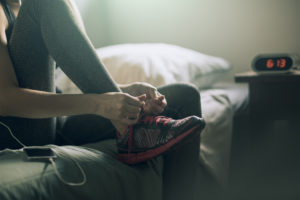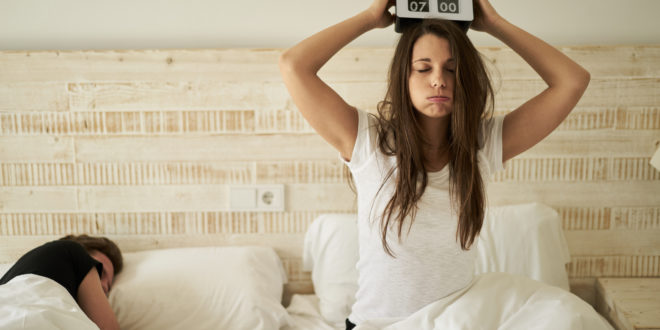by Michelle Sutton-Kerchner
With the recent kickoff of Daylight Saving Time, sleep has been on a lot of minds. For many, losing an hour signals a wake-up call for much-needed sleep hygiene …
Insufficient sleep does more than make you feel crummy. Over time, it can increase your risk of developing serious medical conditions, including heart disease, diabetes, and obesity. Chronic poor sleep has been linked to a shortened lifespan. These realities have led health experts to consider quality sleep to be as critical to one’s health as exercise and proper nutrition.
Elevate Your Workout
Exercise helps your body do amazing things. As you sculpt muscle, increase endurance, and improve overall health, consider sleep as the seal on all your efforts. It solidifies all those crunches, reps, and steps.
 Sleep allows repair and recovery. During deep sleep, the body produces growth hormone. Muscles can repair the small tears that occur during a productive workout. This rebuilding process allows muscles to grow stronger. Despite all this under-cover activity, sleep simultaneously replenishes physical and mental energy. Awaken stronger and sharper!
Sleep allows repair and recovery. During deep sleep, the body produces growth hormone. Muscles can repair the small tears that occur during a productive workout. This rebuilding process allows muscles to grow stronger. Despite all this under-cover activity, sleep simultaneously replenishes physical and mental energy. Awaken stronger and sharper!- Those who get enough sleep are more accountable to their fitness goals. Studies show individuals who slept more were more likely to adhere to a fitness program. Most of us are not motivated to do the dinner dishes when tired, let alone accomplish a workout. Sleep well and stay committed.
 Quality sleep improves the workout itself. Not only will getting enough sleep give you the stamina to exercise, it will improve the time you dedicate to fitness. Although eight solid hours of shuteye won’t allow you to bench press more or run faster, it makes exercises easier to perform and with less risk of injury. You will not fatigue as quickly, allowing you to work out to maximum capacity.
Quality sleep improves the workout itself. Not only will getting enough sleep give you the stamina to exercise, it will improve the time you dedicate to fitness. Although eight solid hours of shuteye won’t allow you to bench press more or run faster, it makes exercises easier to perform and with less risk of injury. You will not fatigue as quickly, allowing you to work out to maximum capacity.
Get Busy Sleeping
The Centers for Disease Control and Prevention estimate about 30 percent of Americans walk the earth sleep-deprived. This contributes to dangerous scenarios, ranging from drowsy driving to metabolic syndrome. And, for those pursuing a healthier lifestyle, sleep deprivation sabotages fitness efforts and healthful eating. (The latter results from hormone fluctuations and comfort-food binging.) Train smarter, lose those lingering extra pounds, and reach your fitness goals. Choose to snooze.
 Consider time spent sleeping as productive. While at rest, your body is busy healing, repairing, growing stronger, and creating better health. With that mentality, you may be less reluctant to turn in early for a replenishing night’s rest. After all, you need that valuable slumber. Your body has a lot to accomplish during those Zzzs.
Consider time spent sleeping as productive. While at rest, your body is busy healing, repairing, growing stronger, and creating better health. With that mentality, you may be less reluctant to turn in early for a replenishing night’s rest. After all, you need that valuable slumber. Your body has a lot to accomplish during those Zzzs.
Sources
Acefitness.org
CDC.gov
“The Intimate Relationship Between Fitness and Sleep,” by Ashley Mateo at everydayhealth.com.
 Fitness & Wellness News Your Source for Fitness News, Wellness News, Health News, and Nutrition News!
Fitness & Wellness News Your Source for Fitness News, Wellness News, Health News, and Nutrition News!




